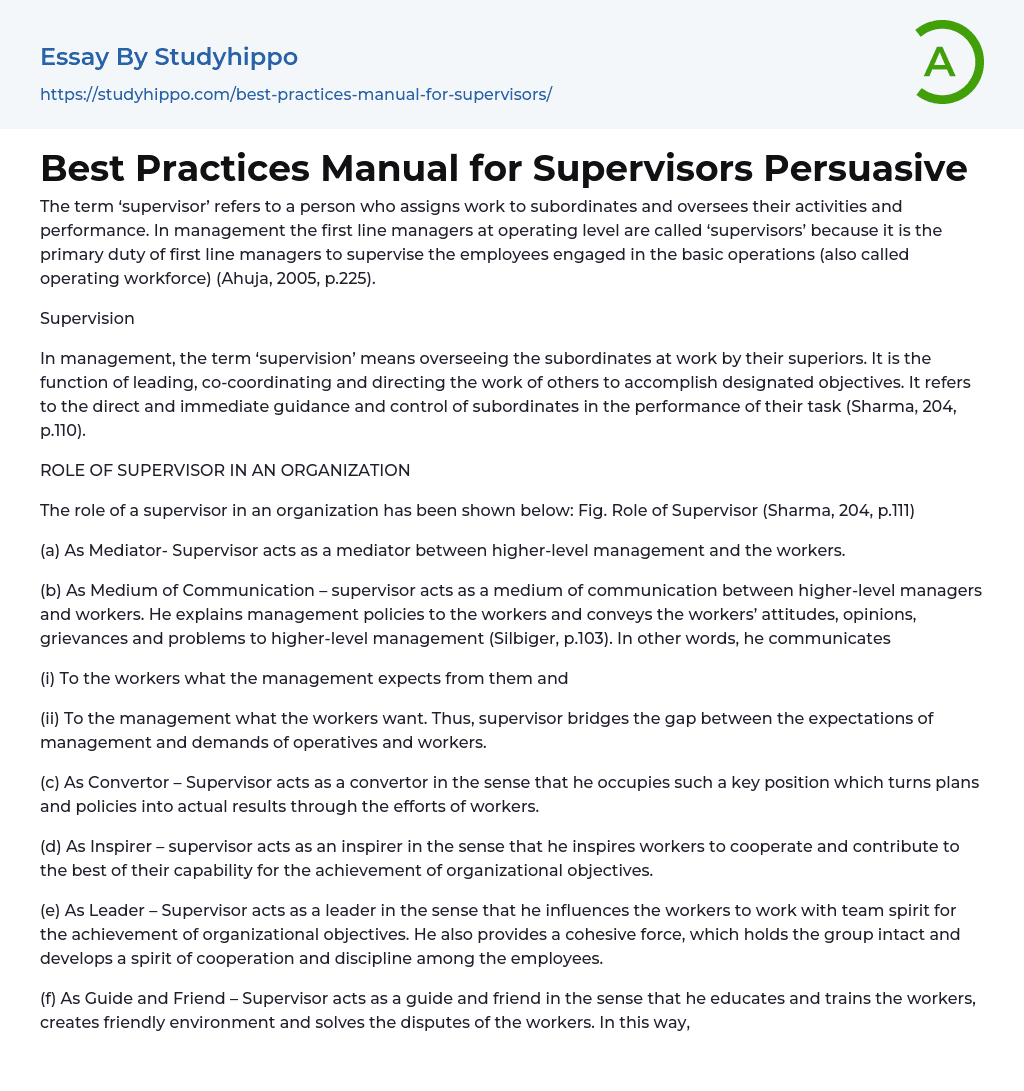

Best Practices Manual for Supervisors Persuasive Essay Example
The term ‘supervisor’ refers to an individual who assigns work to subordinates and oversees their activities and performance. In the field of management, first line managers at the operating level are commonly referred to as ‘supervisors’. This is because the primary responsibility of first line managers is to supervise the employees involved in the fundamental operations, also known as the operating workforce (Ahuja, 2005, p.225).
Supervision
Supervision in management refers to the direct and immediate guidance and control of subordinates by their superiors. It involves leading, coordinating, and directing their work to achieve specific goals (Sharma, 204, p.110).
The role of a supervisor in an organization is crucial.
The given text showcases the role of a supervisor in an organization, as illustrated in Figure "Role of Supervisor" (Sharma, 204, p.111).
The Mediator-Supervisor serves as a liaison between the employees and upper-level manageme
...nt.
The supervisor serves as a communicator, connecting higher-level managers with workers. They have the responsibility of conveying management policies to the workers and communicating the attitudes, opinions, grievances, and problems of the workers to higher-level management (Silbiger, p.103).
(i) The workers are expected by management to do what they want them to do.
The supervisor acts as a mediator, connecting management and workers by communicating the workers' needs to management.
The Supervisor plays a crucial role by serving as a converter, transforming plans and policies into measurable outcomes with the assistance of employees.
The role of a supervisor as an inspirer is to encourage workers to work together and utilize their skills in order to achieve the organization's goals.
The Supervisor functions as a leader, motivating employees to collaborate and pursue organizational goals. Additionally, they foster teamwork and discipline among workers while
serving as a unifying force within the group.
(f) The supervisor acts as both a mentor and companion, offering guidance and training to employees while also fostering a pleasant environment and resolving conflicts. These efforts contribute to team camaraderie, collaboration, and overall order (Sharma, 2004, p.115).
Thus, the Supervisor's role encompasses ensuring the effectiveness of operations as well as fostering team spirit, cooperation, and discipline among employees.
Determining the most effective methods for orientation and training is crucial.
• Training and Development
Training is typically understood as the process of supplying employees with knowledge or job skills that are necessary to fulfill immediate job or organizational requirements. This encompasses various activities, such as teaching assembly workers new techniques to enhance their productivity or instructing managers on effective time management (Yvonne, 1999, p.120).
Development typically involves getting employees ready for long-term opportunities, addressing both personal and organizational requirements, and having a broader scope.
Typically, in an organization, the supervisor offers training and development through a set of four steps.
(a) The process of identifying the training and development needs of employees includes:
(b) creating a training plan tailored to each individual;
(c) selecting, designing, or conducting training activities;
(d) evaluating the results.
There are three main methods that a supervisor uses to identify training needs in an organization.
i. Training is required immediately for new employees to perform their work satisfactorily.
ii. Performance appraisals can identify the need for further training based on an employee's output, or the employee may request specific training.
iii. Employees are trained in anticipation of future needs, often related to technology.
According to Yvonne (1999, p.125), supervisors should carefully evaluate training as a potential solution for problems. However, there are
situations where alternative approaches may be more beneficial. These alternatives include making adjustments to the job or specific aspects of it, modifying the salary structure, or implementing flexible working hours. It is crucial to recognize that in certain cases, different training activities are used solely for the purpose of motivating employees.
Supervisors in certain organizations establish formal training plans for their employees, which differ in specificity based on the employee's position level. Lower-level positions have more detailed plans while higher-level positions have more general ones. In certain instances, this training is incorporated into an individual's career progression.
• Enhancing the Workplace Atmosphere
People whose work is highly specialized, repetitive and routine may become dissatisfied with their job, which can be observed through reduced output, increased absenteeism, and high staff turnover. These factors quickly diminish the effectiveness of a work area and consequently impact the effectiveness of the entire organization. To address this issue, various approaches have been devised.
- American Dream essays
- Barriers To Entry essays
- Capitalism essays
- Central Bank essays
- Compensation essays
- Consumerism essays
- Economic Development essays
- Economic Growth essays
- Economic Inequality essays
- Economic System essays
- Economy essays
- Employment essays
- Export essays
- Finance essays
- Free Trade essays
- Gross Domestic Product essays
- Human Development essays
- Income Inequality essays
- Industry essays
- Inflation essays
- International Business essays
- International Trade essays
- Macroeconomics essays
- Materialism essays
- Max Weber essays
- Microeconomics essays
- Minimum Wage essays
- Monetary Policy essays
- Monopoly essays
- Pricing essays
- Profit essays
- Recession essays
- resources essays
- Taxation essays
- Trade essays
- Unemployment essays
- Warehouse essays
- World economy essays
- John Locke essays
- 9/11 essays
- A Good Teacher essays
- A Healthy Diet essays
- A Modest Proposal essays
- A&P essays
- Academic Achievement essays
- Achievement essays
- Achieving goals essays
- Admission essays
- Advantages And Disadvantages Of Internet essays
- Alcoholic drinks essays



